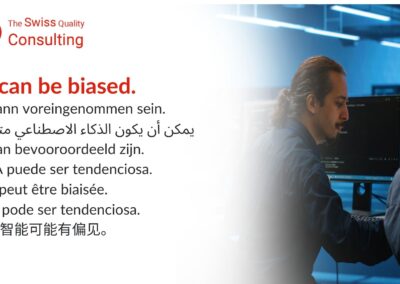Ensuring Ethical and Fair AI Deployment in Business and Society
The Importance of Addressing AI Bias and Fairness
Addressing AI bias and fairness involves implementing measures to ensure that artificial intelligence systems are designed and deployed in ways that promote equity and prevent discrimination. As AI technology becomes increasingly integrated into various aspects of life and business, particularly in regions like Saudi Arabia and the UAE, it is critical to address the ethical implications associated with AI bias. AI systems, while powerful, can inadvertently perpetuate existing biases in data, leading to unfair outcomes in decision-making processes.
In cities such as Riyadh and Dubai, AI is being utilized across sectors such as finance, healthcare, and public administration. These systems analyze vast amounts of data to make predictions and decisions, often with significant impacts on individuals’ lives. If the data used to train AI models contain biases, the outcomes can be discriminatory, affecting employment, credit scoring, law enforcement, and more. Ensuring that AI systems are fair and equitable is not only a technical challenge but also a moral and ethical imperative.
Business executives, mid-level managers, and entrepreneurs must prioritize fairness in AI to build trust with stakeholders and ensure compliance with evolving regulations. Implementing comprehensive strategies to identify and mitigate biases in AI systems is essential for promoting fairness. Executive coaching services can assist leaders in understanding the complexities of AI ethics and developing policies that align with both business objectives and ethical standards.
Technological and Methodological Approaches to Mitigating AI Bias
Various technological and methodological approaches can be employed to mitigate AI bias and promote fairness. In the UAE, where technological innovation is a key driver of economic growth, these solutions are being actively explored to enhance the ethical deployment of AI systems.
One approach is to ensure diverse and representative data sets. AI systems learn from the data they are trained on, so it is crucial to include diverse perspectives and avoid over-representing any particular group. In Riyadh, businesses are increasingly focusing on curating balanced data sets to train their AI models, thereby reducing the risk of bias. This involves rigorous data collection and validation processes to ensure that all relevant demographics are fairly represented.
Another approach is to employ fairness-aware machine learning algorithms. These algorithms are designed to identify and correct biases during the training process. Techniques such as re-weighting, re-sampling, and adversarial debiasing can be used to ensure that AI models do not favor one group over another. In Dubai, companies are integrating these advanced algorithms into their AI development workflows to enhance fairness in outcomes.
Transparency and accountability are also critical in addressing AI bias. Businesses must adopt practices that make AI decision-making processes understandable and explainable. This involves developing tools and frameworks for auditing AI systems to detect and mitigate biases. Executive coaching services can support leaders in establishing governance structures that prioritize transparency and accountability in AI deployment, fostering a culture of ethical AI use.
The Role of Leadership in Promoting Fair AI Practices
Leadership plays a pivotal role in promoting fair AI practices within organizations. Business executives and entrepreneurs must lead by example, demonstrating a commitment to ethical AI deployment. In Saudi Arabia and the UAE, where leadership development is a key focus, integrating fairness principles into AI strategies is essential for achieving business success and maintaining public trust.
Executive coaching services can assist leaders in developing a deep understanding of AI ethics and its implications for their organizations. Coaches can help leaders formulate policies that prioritize fairness and guide decision-making processes. By fostering a culture of inclusivity and equity, leaders can ensure that their AI systems align with ethical standards and societal values.
Collaboration among businesses, governments, and civil society is also vital for addressing AI bias and promoting fairness. In Riyadh and Dubai, public-private partnerships can play a significant role in developing and implementing ethical frameworks for AI deployment. These collaborations help create a shared vision for fair and equitable AI, fostering trust and confidence in digital innovations.
Moreover, continuous education and training are essential for keeping abreast of the latest developments in AI ethics. Leaders must invest in ongoing learning opportunities for themselves and their teams to stay informed about emerging trends and best practices in AI fairness. This proactive approach ensures that organizations remain adaptable and resilient in the face of evolving ethical challenges.
Case Studies: Successful Implementation of Fair AI Practices
Several case studies highlight the successful implementation of fair AI practices in the UAE and Saudi Arabia. These examples demonstrate how businesses can leverage advanced technologies and ethical frameworks to promote fairness in AI systems.
In Dubai, a leading financial institution has adopted fairness-aware machine learning algorithms to enhance its credit scoring processes. By using diverse data sets and transparency tools, the institution has significantly reduced biases in its credit decisions, ensuring fairer outcomes for all applicants. This approach has not only improved customer trust but also enhanced the institution’s reputation for ethical practices.
In Riyadh, a healthcare provider has integrated AI-driven diagnostic tools to improve patient care. To address potential biases, the provider implemented rigorous data validation processes and employed fairness-aware algorithms. As a result, the AI tools have provided more accurate and equitable diagnoses, benefiting patients across various demographics. This case highlights the importance of ethical AI in enhancing healthcare outcomes and patient satisfaction.
Another notable example is the deployment of AI in law enforcement in the UAE. To prevent discriminatory practices, law enforcement agencies have adopted transparent AI systems that allow for auditability and accountability. By collaborating with academic institutions and civil society organizations, these agencies have developed ethical guidelines that ensure AI systems are used fairly and justly. This collaborative approach has strengthened public trust in law enforcement and demonstrated the potential of ethical AI.
Conclusion: Ensuring Fairness in AI for a Better Future
Addressing AI bias and fairness is a critical aspect of ensuring that artificial intelligence systems are designed and deployed in ways that promote equity and prevent discrimination. As technology continues to advance in Saudi Arabia, the UAE, and globally, businesses must prioritize fairness in AI to safeguard personal information and build trust with users. By adopting advanced technologies, implementing best practices, and promoting a culture of ethical AI use, organizations can navigate the challenges of AI bias and achieve sustained success.
Executive coaching services can play a pivotal role in guiding leaders to develop effective fairness strategies and fostering a culture of ethical AI within their organizations. By staying informed and adaptable, businesses can maintain their competitive edge while ensuring the protection of personal information in an increasingly connected world.
—
#AIBias #FairnessInAI #ArtificialIntelligence #Equity #Discrimination #DataEthics #MachineLearning #SaudiArabia #UAE #Riyadh #Dubai #BusinessSuccess #Leadership #ManagementSkills #ProjectManagement























